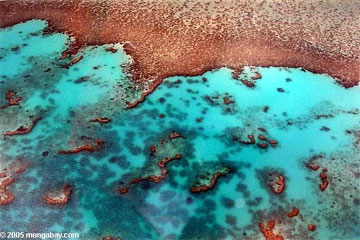Today, many of our planet’s natural areas are seriously threatened by human incursion, overexploitation and global warming: Less than a fifth of the world’s original forest cover remains in unfragmented tracts, while just one-third of coastal mangroves survive to protect coastlines from storms and erosion. But none of these are declining as rapidly as coral reefs. By revealing what could be in store for other natural systems, reefs resemble the proverbial canary in a coal mine.
Jacques Cousteau first brought the wonders of these underwater marine vistas to millions around the globe, just over 50 years ago. In award-winning documentaries like “Silent World,” he captured in living Technicolor the awesome beauty of the Earth’s oldest and largest living structures.
Providing a safe harbor where more than a quarter of all marine life can feed, spawn and raise their young, reefs’ ecological diversity rivals that of the world’s lushest rainforests. Unlike the forests, however, the relative remoteness of many reefs seemed to promise a small degree of protection for these fragile ecosystems.
 Great Barrier Reef in Australia |
What a difference 50 years makes.
The combination of destructive fishing practices and marine pollution hits reefs hard. A 2006 U.N. report found that close to one-third of corals are already destroyed or damaged, a figure that could double by 2030. And as reefs are extremely sensitive to changes in both the temperature and acidity of seawater, climate change will only make this situation worse.
Indeed, the former chief scientist of the Australian Institute of Marine Science warned in a recent presentation to the Royal Society of London that, “There is no hope of reefs surviving to even mid-century in any form that we now recognize and when, they go, they will take with them about one-third of the world’s marine biodiversity.” Like the rapidly shrinking Arctic ice cap, recent research has accelerated estimates on the risk to corals by decades, if not centuries.
Healthy ecosystems are important for our economies and our survival.
Reefs sustain many commercial fisheries and reduce the impact of large storms on coastal populations, saving communities more than $9 billion every year. New drugs developed from natural sources, both above and below the waves, are used to treat everything from heart disease to leukemia. In fact, the renowned AIDS treatment drug AZT is based on chemicals discovered in a Caribbean reef sponge. Researchers also recently discovered a compound in a species of coral near Taiwan that could help patients with severe nerve damage.
To give reefs and other ecosystems a chance, it’s crucial that world leaders embark upon a combined effort to protect earth’s remaining natural areas, beyond even international attempts to control global warming emissions.
To lead the rest of the world toward an effective conservation strategy the United States must first develop one itself. Right now, no less than six U.S. agencies are involved in helping other countries conserve their natural resources. Yet various initiatives often lack coordination, and the federal government doesn’t have any overarching policy or common metrics to determine whether or not these disparate efforts add up to real progress.
To help address this problem, the president should direct his advisers to develop a coordinated global conservation strategy for all federal agencies. At home this would allow the White House to assess the effectiveness of U.S. programs that are implemented overseas, while abroad the United States could speak with more authority in calling for a new plan to protect the Earth’s last vestiges of nature. It’s tragic that so many of the vibrant ecosystems Jacques Cousteau documented a few short decades ago have become desolate seascapes.
Scientists estimate we have only a decade to boost conservation efforts, or we face irreversible losses. To meet this challenge, the president must work together with his counterparts around the globe — soon.
We have a window of opportunity to save much of what’s left, but that window is quickly closing.
Jeff Wise directs The Pew Charitable Trusts’ Global Conservation Initiative